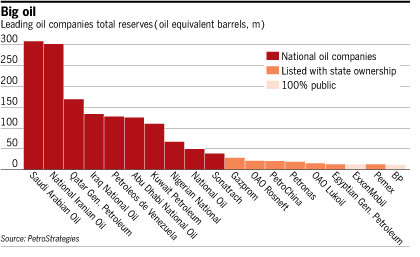Many in the left to far-left eschew the liberal title nowadays (since they consider liberals now to be wimps and too moderate, like that Clinton guy) in favor of the term "progressive". This term has gone in and out of favor for over a century, from the populists of the early 1900's to the socialists of the more modern era.
Most "progressives" (meaning those on the left to far left who prefer that term) would freak if they were called conservative, but what I mean by conservative in this context is not donate-to-Jesse-Helms capital-C Conservative but fearful of change and uncomfortable with uncertainty conservative.
OK, most of you are looking at this askance - aren't progressives always trying to overthrow the government or something? Aren't they out starting riots at G7 talks? The answer is yes, sure, but what motivates many of them, at least where it comes to capitalism, is a deep-seated conservatism.
Before I continue to support this argument, I must say that on a number of issues, particularly related to civil liberties and social issues, I call progressives my allies. On social issues, progressives, like I do, generally support an individual's right to make decisions for themselves, as long as those decisions don't harm others.
However, when we move to fields such as commerce, progressives stop trusting individual decision-making. Progressives who support the right to a person making unfettered choices in sexual partners don't trust people to make their own choice on seat belt use. Progressives who support the right of fifteen year old girls to make decisions about abortion without parental notification do not trust these same girls later in life to make their own investment choices with their Social Security funds. And, Progressives who support the right of third worlders to strap on a backpack of TNT and explode themselves in the public market don't trust these same third worlders to make the right decision in choosing to work in the local Nike shoe plant.
Beyond just the concept of individual decision-making, progressives are hugely uncomfortable with capitalism. Ironically, though progressives want to posture as being "dynamic", the fact is that capitalism is in fact too dynamic for them. Industries rise and fall, jobs are won and lost, recessions give way to booms. Progressives want comfort and certainty. They want to lock things down the way they are. They want to know that such and such job will be there tomorrow and next decade, and will always pay at least X amount. That is why, in the end, progressives are all statists, because, to paraphrase Hayek, only a government with totalitarian powers can bring the order and certainty and control of individual decision-making that they crave.
Progressive elements in this country have always tried to freeze commerce, to lock this country's economy down in its then-current patterns. Progressives in the late 19th century were terrified the American economy was shifting from agriculture to industry. They wanted to stop this, to cement in place patterns where 80-90% of Americans worked on farms. I, for one, am glad they failed, since for all of the soft glow we have in this country around our description of the family farmer, farming was and can still be a brutal, dawn to dusk endeavor that never really rewards the work people put into it.
This story of progressives trying to stop history has continued to repeat itself through the generations. In the seventies and eighties, progressives tried to maintain the traditional dominance of heavy industry like steel and automotive, and to prevent the shift of these industries overseas in favor of more service-oriented industries. Just like the passing of agriculture to industry a century ago inflamed progressives, so too does the current passing of heavy industry to services.
In fact, here is a sure fire test for a progressive. If given a choice between two worlds:
- A capitalist society where the overall levels of wealth and technology continue to increase, though in a pattern that is dynamic, chaotic, generally unpredictable, and whose rewards are unevenly distributed, or...
- A "progressive" society where everyone is poorer, but income is generally more evenly distributed. In this society, jobs and pay and industries change only very slowly, and people have good assurances that they will continue to have what they have today, with little downside but also with very little upside.
Progressives will choose #2. Even if it means everyone is poorer. Even if it cuts off any future improvements we might gain in technology or wealth or lifespan or whatever. They want to take what we have today, divide it up more equally, and then live to eternity with just that. Progressives want #2 today, and they wanted it just as much in 1900 (just think about if they had been successful -- as just one example, if you are over 44, you would have a 50/50 chance of being dead now).
Don't believe that this is what they would answer? Well, first, this question has been asked and answered a number of times in surveys, and it always comes out this way. Second, just look at any policy issue today. Take prescription drugs in the US - isn't it pretty clear that the progressive position is that they would be willing to pretty much gut incentives for any future drug innovations in trade for having a system in place that guaranteed everyone minimum access to what exists today? Or take the welfare state in Continental Europe -- isn't it clear that a generation of workers/voters chose certainty over growth and improvement? That workers 30 years ago voted themselves jobs for life, but at the cost of tremendous unemployment amongst the succeeding generations?
More recently, progressives have turned their economic attention to lesser developed nations. Progressives go nuts on the topic of Globalization. Without tight security, G7 and IMF conferences have and would devolve into riots and destruction at the hands of progressives, as happened famously in Seattle. Analyzing the Globalization movement is a bit hard, as rational discourse is not always a huge part of the "scene", and what is said is not always logical or internally consistent. The one thing I can make of this is that progressives intensely dislike the change that is occurring rapidly in third world economies, particularly since these changes are often driven by commerce and capitalists.
Progressives do not like American factories appearing in third world countries, paying locals wages progressives feel are too low, and disrupting agrarian economies with which progressives were more comfortable. But these changes are all the sum of actions by individuals, so it is illustrative to think about what is going on in these countries at the individual level.
One morning, a rice farmer in southeast Asia might faces a choice. He can continue a life of brutal, back-breaking labor from dawn to dusk for what is essentially subsistence earnings. He can continue to see a large number of his children die young from malnutrition and disease. He can continue a lifestyle so static, so devoid of opportunity for advancement, that it is nearly identical to the life led by his ancestors in the same spot a thousand years ago.
Or, he can go to the local Nike factory, work long hours (but certainly no longer than he worked in the field) for low pay (but certainly more than he was making subsistence farming) and take a shot at changing his life. And you know what, many men (and women) in his position choose the Nike factory. And progressives hate this. They distrust this choice. They distrust the change. And, at its heart, that is what the opposition to globalization is all about - a deep seated conservatism that distrusts the decision-making of individuals and fears change, change that ironically might finally pull people out of untold generations of utter poverty.
In fact, over the last 20 or so years, progressives have become surprisingly mute on repression and totalitarianism the world over. In the 1970's, progressives criticized the US (rightly, I think) for not doing more to challenge the totalitarian impulses of its allies (the Shah of Iran comes to mind in particular) and not doing enough to end totalitarianism and repression in other nations (e.g. South Africa, Guatemala, El Salvador, etc etc)
Today, progressives have become oddly conservative about challenging totalitarian nations. By embracing the "peace at any cost" mantra, they have essentially said that they can live with anything, reconcile anything, as long as things remain nominally peaceful (ie, no battles show up on the network news). Beyond just a strong anti-Americanism, the peace movement today reflects a strong conservatism -- they want to just leave everyone alone, no matter how horrible or repressive, and hope that they will in turn leave us alone. They fear any change that would stir things up.
There are any number of other examples of the strong conservative streak in the progressive movement. Here are a few more that come to mind:
- Despite at least 40 years of failure in the public schools, progressives vociferously oppose any radical changes to the public education system. In particular, they resist any program involving school choice, as they are totally condescending in their utter lack of faith in the average parent's ability to make the right choice for their family.
- Progressives refuse to even consider the possibility that individuals should be trusted to make their own decisions regarding some portion of their Social Security retirement funds. They can couch their opposition in a lot of fear talk about benefit cuts, but at the end of the day (and take this from someone who has had this argument with numerous liberals and progressives) the argument always boils down to "we don't trust people to make investment decisions that are as good as the ones we would make for them".
Well, I have again written too long, and I'm tired. If you are not ready to rush to defend the barricades of capitalism, you might read my post from last week called "60 Second Refutation of Socialism, while Sitting at the Beach". Most of what I have written here has been said far more eloquently by others. Of recent writers, Virginia Postrel, in the Future and its Enemies, has written a whole book on not just capitalism but dynamism and progress in general, and why people of all political persuasions tend to be scared by it. Brink Lindsey addressed many of these same issues as well in his book Against the Dead Hand. Of course, the Godfather of individual choice and societal dynamism is Friedrich Hayek.

